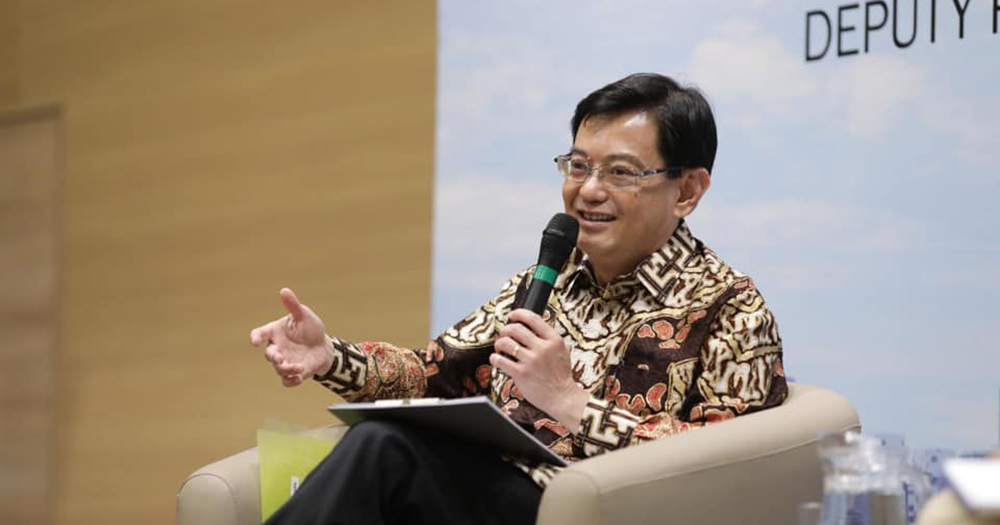Deputy Prime Minister (DPM) and Finance Heng Swee Keat had been busy sharing his thoughts on the important issues concerning Singapore over the past one and a half months as Singapore's second in command.
They include:
Today, Heng was the keynote speaker at the closing session of the inaugural international conference on cohesive societies (Jun 21).
And the focus of his speech was how to build a cohesive society in a racially and religious diverse country like Singapore.
Heng provided three ways in how Singapore has approach this issue.
1. Expansion of shared spaces and experiences, while preserving racial and religious diversity
On this matter, Heng highlighted the implementation of English as the working language of Singapore, explaining that the purpose was to ensure that people of different ethnic groups would have a common language to work and interact with each other, along with the rest of the world.
Heng also referenced the implementation of the Ethnic Integration Policy in 1989, adding that such a policy ensured Singapore's public housing estates had a balanced mix of ethnic groups to promote inter-racial interaction and harmony.
Additionally, common spaces such as hawker centres, community centres and civic spaces were regularly rejuvenated as part of efforts to foster such interaction.
Heng also pointed to the national school system and National Service, stating that such areas had helped to foster shared experiences, regardless of race, language or religions.
At the same time, Heng noted that steps had also been taken to conserve religious and cultural landmarks such as Kampong Glam, Chinatown and Little India.
What's more, the festivals of various ethnic and religious communities were also celebrated in Singapore.
Heng acknowledged however, that Singapore's demography was evolving to become more diverse.
He added that this meant common spaces will become increasingly difficult to maintain, thereby requiring deliberate efforts for their sustainment and expansion.
2. Guarding against forces that can tear society apart
With regard to this area, Heng referenced multiple institutions that had been established to foster understanding between different communities.
Here, Heng highlighted the following institutions:
- The Presidential Council for Minority Rights,
A body that scrutinises bills passing through Parliament to ensure they do not discriminate against any racial or religious communities.
- The President Council for Religious Harmony,
A body that advises the government on matters affecting the maintenance of religious harmony in Singapore.
- The National Steering Committee on Racial and Religious Harmony (NSC),
An organisation with its membership comprising of leaders from faith and ethnic groups, to guide the government's engagement on racial and religious harmony.
- 89 Intra-Racial and Religious Circles (IRCCs) at the constituency level.
Entities that serve as platforms for communities and religious organisation to reach out to one another and partake in common activities such as charitable acts and community services.
Additionally, Heng highlighted the existence of legislation that had been put in place to protect against potential social fault lines, such as the Maintenance of Religious Harmony Act and The Protection from Online Falsehoods and Manipulation Act.
He added that such legislation allow the government to act where deemed necessary for the protection of society.
Heng acknowledged however, that religious demographics were shifting in Singapore, particularly with the decline of homogeneity of religion within ethnic groups.
Heng elaborated that there were greater numbers of interfaith families, as well as people who did not identify with any traditional ethnic affiliations or religions.
As such, it was important to include the perspectives of such people in future discourses.
3. Provide Singaporeans with better lives, and to ensure that they share the fruits of S’pore’s progress.
Heng said that the government puts a special focus on creating good jobs, regardless of which community Singaporeans belong to.
He however noted that building an inclusive and cohesive society in Singapore is always a work in progress, adding that everyone has a role to play in building cohesive societies.
Hence, Heng made the call to Singaporeans in the audience that “the government is committed to working in partnership with you, to build a future where everyone plays a part, and feels a sense of belonging”.
He reiterated the hope to “build a democracy of deeds” in Singapore, a hope he first shared in a major speech on governance last Saturday.
He added that this democracy of deeds is a goal where everyone chips in with their strengths and passions to build a society they can all be proud of.
Top image from Heng Swee Keat Facebook
If you like what you read, follow us on Facebook, Instagram, Twitter and Telegram to get the latest updates.
